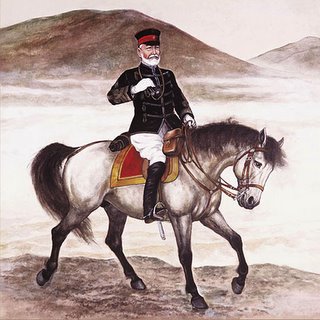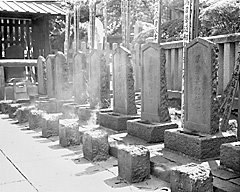Count Nogi.

This is coolbert:
Please read this article written by the illustrious Briton, Sir Robert Baden-Powell [click here to read]. The founder of the Boy Scouts.
While on a world trip to review the Boy Scout movement in various countries where it had been established, Baden-Powell visited Japan. Scouting was in it's infancy in Japan at the time, but was a growing concern.
[of course, Baden-Powell developed the scouting movement as a means of training young men and boys of leadership potential for possible future military service. Baden-Powell saw scout training as a remedy for the inability of young men of high social caliber to live and function in a rugged, outdoors environment. Such as one would find during a time of war. Young British nobles WERE NOT able to live normally and function and lead troops under conditions they were not accustomed to. Scouting was seen as a means to overcome this problem!!]
Baden-Powell's article about Japan emphasized the heroics of Count Nogi, of Russo-Japanese War fame, and the forty-seven ronin of feudal Japanese lore. Persons that Sir Robert felt western youth were wise to emulate. At least to a degree in the sense that Nogi and the ronin thought of self-sacrifice and courage in the face of great danger.
From the writings of Sir Robert:
[as usual, my comment in bold!!]
"Count Nogi, the Great Japanese General
[after the end of his military career, Nogi was headmaster of the school where Hirohito and his brothers were educated. Nogi had profound effect upon the entire Japanese nation!!]
Hara-kiri, the killing of oneself from a sense of duty, is a custom amongst, men of the highest rank of the Japanese.
Count Nogi considered that his highest duty was to his Emperor, and it was to prove this that he put an end to his life when his master, the Emperor, died."
At the exact moment of the burial of the Meiji Emperor, Nogi took his own life, with his wife taking her life only moments later.
"In the war between Japan and Russia in 1904, General Nogi commanded the Japanese forces which captured Port Arthur.
Here came his first trial.
With his army he attacked this great fortress, and although it looked an almost impossible task to capture it, he and his troops went at it again and again, until, in spite of fearful loss, they succeeded in storming the place, and thereby took 41,000 Russians and 700 guns.
But to gain this triumph the General suffered heavy personal loss ; his eldest son, Shoten, was killed in one of the earlier battles of the siege. Later the Japanese found it necessary, if they wished to take Port Arthur, to storm a very strong position called "203 metre Hill." On this depended the taking of the whole fortress. It was the key to the position.
The fight was bound to be a bitter one to the death. A picked force of Japanese was chosen to carry out this desperate duty, and when it had been formed, General Nogi placed his only other son, Hoten, in command, and this son was killed in the attack which followed.
The General also had with him a faithful servant who had accompanied him everywhere and was a close friend. This servant was killed. The General's favourite dog, which always went with him, was also killed.
But Nogi, although he felt the most bitter grief, made no sign, he forced himself to bear his personal losses as a matter of duty, in carrying out his higher duty to his Emperor and to his country; and right nobly he did it."
Nogi lost his two sons and his personal servant in the siege of Port Arthur. After the campaign, Nogi was seen wearing three crosses in memorial for the deaths!!
"So the first gun of the salute to the dead Emperor was the signal to his faithful soldier to kill himself and follow him.
At the General's side was also his devoted wife, who took the same signal to stab herself and follow her husband. In this way they each carried out their high sense of duty, proving how the power of will and sense of duty are stronger than death."
Nogi first, then his wife!!
"The Story of the Forty-seven Ronins
I visited the graves of the forty-seven Ronins at Tokio. Every Japanese boy knows the story of the forty-seven Ronins, so I will tell it to you."
Sir Robert WAS conversant in the "tale" of the ronin.
"But his own particular retainers, forty-seven of them, were so fond of him and so angered at his death that they swore to avenge it by killing Kotsuke."
The death of the master Takumi was followed by the vengeance of the forty seven retainers [who became ronin [wandering]].
"The End of the Ronins
Among the papers preserved at the temple is still to be seen that which the priest wrote acknowledging the receipt of Kotsuke's head.
After it was all over, the forty-seven went down from the hill-side satisfied that they had done their duty and could now die happy.
They went straightway and gave themselves up to the authorities, and asked that they might be allowed to kill themselves instead of being executed-and this was granted.
So the whole forty-seven, from the oldest of seventy-seven down to the youngest of sixteen, all committed hara-kiri."

After avenging the death of their master, the ronin themselves committed suicide.
Joseph Campbell, the myth man, writes also of Nogi, quoting a Japanese newspaper editor commenting on the suicide of Nogi:
"And there is an interesting grief poem celebrating the suicide of Count Nogi, composed by the editor, Ruiko Kuroiwa, of the newspaper Yorozo Choho, which reads as follows:
'Falsely, I thought him
An old Soldier:
Today, I confess him
God Incarnate.'"
An old Soldier:
Today, I confess him
God Incarnate.'"
Heavy stuff. Very heavy.
coolbert.

0 Comments:
Post a Comment
Subscribe to Post Comments [Atom]
<< Home